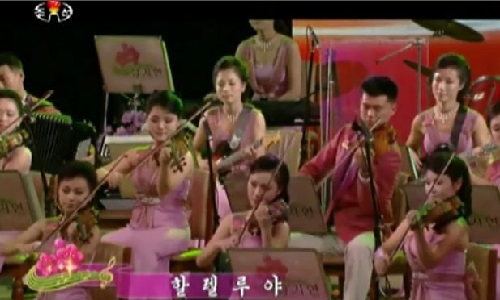Following initial working-level talks on January 15 it has been announced that during the 2018 Pyeongchang Olympic Games, North Korea’s 140-member Samjiyon Orchestra will be performing in the city of Gangneung, where a number of Olympic events are taking place.
Debate over significance of ‘Samjiyon’ name
Although numerous observers have suggested that North Korea could send the Moranbong Band – a Kim Jong Un favorite and also well-known in international media – the subsequent announcement of the participation of the Samjiyon Orchestra came as a surprise. While North Korea has not yet released the details of the makeup of the orchestra, observers point to the Mansudae Art Troupe-affiliated Samjiyon Band, which has experience in performing classical music, as a likely foundation for the new group.
However, North Korea’s state-run publication Rodong Sinmun did not use the Samjiyon Orchestra name when reporting on the inter-Korean Olympics talks. It stands to reason that either North Korea does not believe the name to be significant, or they are deliberately omitting the name from reports on the matter.
A source in North Pyongan Province who spoke with Daily NK on January 17 said, “I’ve heard of the Wangjaesan Light Music Band and the Moranbong Band, but I’ve never heard of the Samjiyon Orchestra. But it’s not particularly noteworthy that they’re using this name for the group. Perhaps it’s just Kim Jong Un playing around with new names, or some composition-related decision made by the performing arts department.”
While few details of the group have emerged, the issue is attracting international interest, once again highlighting North Korea’s penchant for attracting global attention.
North looks to maximize propaganda value of orchestra
There is concern that North Korea may try to promote Kim Jong Il’s birthday for propaganda purposes during the games since the day – February 16 – coincides with the Olympics. But instead of trying to get away with propaganda during performances, the North may simply try to organize performance dates on and around February 16 in order to maximize attention toward Kim Jong Il’s birthday.
The North has likely learned from an experience in 2015 when the Moranbong Band was forced to cancel a show in China when Chinese authorities deemed the military-related content of the performance to be too sensitive. Instead, they may try to deliver a performance on Kim Jong Il’s birthday, perhaps followed by songs of “yearning for unification,” thereby indirectly delivering a propaganda message.
The group could also use the Lunar New Year holiday (February 15-17), celebrated in both North and South Korea, which also coincides with Kim Jong Il’s birthday. By outwardly promoting performances in Seoul or Gangneung as Seollal-related and playing songs shared by both Koreas such as “Arirang,” the North will be able to grab the attention of South Koreans and perhaps influence public opinion through other North Korean songs.
A previous example of this came in August 2000, where North and South Korean symphony orchestras performed at KBS Hall in Seoul. The North’s National Symphony Orchestra played classics such as Tchaikovsky’s Symphony No. 4, as well as North Korean songs lauding their country, such as “Bumper Harvest Visits Chongsan Plain,” and “Dear House in my Hometown.”
Small-scale celebrations for Kim Jong Il’s birthday
It also remains to be seen whether other North Korean participants such as the athletes or members of the cheer squad make any mention or acknowledgement of Kim Jong Il’s birthday during the games. Despite South Korea technically being the enemy, North Korean participants may try to impart upon them “the teachings of the revered” Kim Jong Il and Kim Jong Un.
“The [North Korean] authorities are going to try to take advantage of Kim Jong Il’s birthday during the Olympics. Even if they cannot overtly hold a memorial ceremony in South Korea, they may openly do other things such as laying wreaths in their hotels,” a source in Pyongyang said.
“All North Koreans who are going to the Pyeongchang Olympics will be debriefed upon their return to the North and questioned over what they did to commemorate Kim Jong Il’s birthday while they were there.”
During the 2003 Summer Universiade, the North Korean cheer squad held up a banner featuring the image of Kim Jong Il, and when rain made contact with the banner, members of the cheer squad could be seen crying. There will likely be more of this kind of unexpected behavior from North Korean participants at the Pyeongchang games.





















